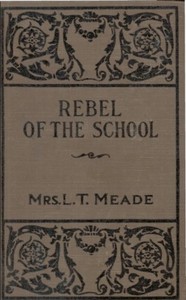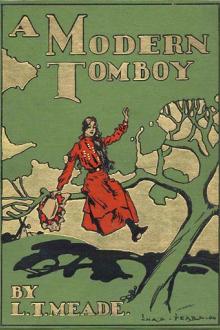The Rebel of the School, L. T. Meade [best historical biographies .txt] 📗

- Author: L. T. Meade
Book online «The Rebel of the School, L. T. Meade [best historical biographies .txt] 📗». Author L. T. Meade
Cassandra started. She looked full at Ruth.
"Is that a slap at me?" she asked.
"No; I did not mean it as a slap at you or anybody. I only see how the matter looks to me, and how it would have looked to father, and how it looks to grandfather. There are some people born that way; I think, after a fashion, I am one of them. There are others who would look at the thing from a different point of view, but I don't think I envy those others. Shall we go in now and set to work?"
"You are an extraordinary girl," said Cassandra. "I really don't know whether I love you or hate you most for being such a little goose. Well, Ruth, if that is your mind, I don't know why you care to go in to work, for it will be all over in a day or two—all over—and your fate sealed."
"Nevertheless I should like to read that piece of Tasso, and do my work with Miss Renshaw. Shall we go in?" said Ruth.
Cassandra somehow did not dare to say any more. Afterwards, when Ruth had returned to her own home, Cassandra sat with her head in her hands for the best part of an hour. Her mother asked her what ailed her.
"I have a headache," she replied. "I was with a girl to-day who is fifty times too good for me."
"What nonsense you are talking, Cassandra! There are few people good enough for you."
"To think of her gives me a headache," continued Cassandra. "If you don't mind, mother, I will go to bed now."
Meanwhile things were moving rather rapidly in another direction. Kathleen O'Hara, walking home that day in the company of Susy Hopkins, eagerly questioned that young lady.
"How prim and proper every one looked in the school to-day!" she said. "What is wrong?"
"There is plenty wrong," said Susy. "I tell you what it is, Kathleen, I feel rather frightened. I suppose it will come to our all being expelled."
"Oh, not a bit of it," said Kathleen.
"Well, it looks rather like it," said Susy. "Do you know what they are doing?"
"What?"
"They are bringing pressure to bear upon Ruth Craven. The governors convened a special meeting yesterday; they had Ruth before them, and then tried by every means in their power to get her to tell. You see, she is in the position of the person who knows everything. She belonged to us for a time, and now she doesn't belong to us."
"Well?" said Kathleen, feeling interested and a little startled.
"She wouldn't tell."
"Of course she wouldn't. She is a brick. The Ruth Cravens of the world are not traitors," said Kathleen. "And so that is what the governors are doing—horrid, sneaky, disagreeable things! But they are not going to subdue me, so they needn't think it. I tell you what it is, Susy. Why should we put off till next week our picnic to town? Can't we have it this week?"
"I wish we could," said Susy. "It would be glorious," she continued. "I do think somehow, Kathleen, that they will catch us in the long run. It might be dangerous to put off our glorious time till next week."
"It might? It certainly would," said Kathleen. "We will go to-morrow evening. School is always over at four. We can meet at the railway station between five and six, and go off all by ourselves to—But where shall we go when we get to town?"
"Couldn't we go to a theatre—to the pit at one of the theatres?"
"If only Aunt Katie O'Flynn was with us it would be as right as right," said Kathleen; "but dare we go alone?"
"I am sure we dare. I shouldn't be frightened. I think some of the girls know exactly how to manage."
"Well, I tell you what. You know most of the names of the members. Go round to-day and see as many as you can. Tell them that I am game for a real bit of fun, and that I will stand treat. We will go to town by the quarter-to-six train to-morrow evening. We will have some refreshments at a restaurant, and then we will go to the pit of one of the theatres. It will be a lark. There will be about forty of us altogether."
"We are sure to be found out. It is too risky; and yet I think we'll do it," said Susy. "Oh, there never was such a lark!"
"Nothing could happen to forty of us," said Kathleen. "I am going to do it just to defy them. How dare they try to make dear little Ruth betray us? But she won't. I am certain she won't."
Susy talked a little longer to Kathleen, and finally agreed to take her message to as many of the Wild Irish Girls as she could possibly reach.
"They will all hear of it safe enough," said Susy. "The whole forty of us will meet you at the station to-morrow night. Oh dear! of course it is wrong."
"It is magnificently wrong; that is the glorious part of it," said Kathleen. "Oh dear! I feel almost as jolly as though I were in old Ireland again."
She laughed merrily, parted from Susy, and ran all the rest of the way home.
CHAPTER XXIV. KATHLEEN AND GRANDFATHER CRAVEN.Friday was emphatically a summer's day in winter. The sky was cloudless; the few leaves that still remained on the trees looked brilliant in their autumn coloring. The ground was crisp under foot; the air was soft, gentle, and pleasant. Girls, like all other creatures, are susceptible to weather; they do their best work and have their best feelings aroused when the sun shines and the day looks cheerful. The sunshiny weather puts heart into them. But it is sad to relate that when a girl is bent on mischief she is even more mischievous, more daring, more defiant when the sun shines and the earth looks gay.
Kathleen awoke on the special morning after a night of wild dreams. She raised herself on her elbow and looked across at Alice.
"What a lovely day! Why, I see sunshine quite plainly from where I am lying. Wake up, won't you, Alice?" she said.
"How tiresome of you to rouse me!" said Alice, opening her eyes and looking crossly at Kathleen.
Kathleen smiled back at her. Her face was rosy. Her hair was tossed in wild confusion about her head and shoulders; it tumbled also over her forehead, and made her eyes look more dancing and mischievous than ever beneath its heavy shadow.
"I wonder—" said Kathleen softly.
If she had spoken in a loud voice Alice would have taken no notice, but there was something pathetic and beautiful in her tone, and Alice raised herself and looked at her.
"I wonder," she said "why you hate me so much?'
"Fudge!" said Alice.
"But Alice, it isn't fudge. Why should I have made myself so terribly obnoxious to you? The others are fond of me; they don't think me perfect—and indeed I don't want them to—but they love me for those qualities in me which are worthy of love."
"How you chatter!" said Alice. "I have hitherto failed to perceive the qualities in you that are worthy of love. It wants another quarter of an hour before our hot water is brought in. Do you greatly object to my sleeping during that time?"
"No, cross patch," said Kathleen, turning angrily on her pillow. "You may sleep till doomsday as far as I am concerned."
"Polite," muttered Alice.
She shut her eyes, folded her arms, and prepared for further slumber; but somehow Kathleen had effectually aroused her. She could not get the radiant face out of her head, nor the words, a little sad in their meaning, out of her ears. She looked up as though moved to say something.
"As you have asked me a question, I will give you an answer. I know a way in which you can secure my good opinion."
"Really!" said Kathleen, who was too angry now to be properly polite. "And what may that way be?"
"Why, this: if you will tell the truth about your horrible society, and spare dear little Ruth Craven, and make Cassandra Weldon happy."
"I don't care twopence about your tiresome Cassandra; but little Ruth—what ails her?"
"The governors are going to insist upon her telling what she knows."
"But she won't," said Kathleen, laughing merrily. "She is too much of a brick."
"Then she'll be expelled."
"What nonsense!"
"You wait and see. You don't know the Great Shirley School as well as I do. However, I have spoken; I have nothing more to say. It is time to get up, after all."
The girls dressed in silence. Alice had long ceased to torment Kathleen about her own side of the room. Provided Alice's side was left in peace, she determined to shut her eyes to untidy wardrobes, to the chest of drawers full to bursting, to a boot kicked off here and a shoe disporting itself there, to ribbons and laces and handkerchiefs and scarves and blouses scattered on the bed, and even on the floor. Alice had learnt to put up with these things; she turned her back on them, so to speak.
The two girls ran downstairs together. Just for a moment Kathleen had felt frightened at Alice's words, but then she cast them from her mind. It was quite, quite impossible to suppose that anything so monstrously unfair as that a little girl should be expelled from the school could happen. Ruth, too, of all the girls—Ruth who was absolutely goodness itself. So Kathleen ate her breakfast with appetite, remarked on the brightness of the day to Mrs. Tennant and the boys, and then with Alice started off to school with her satchel of books slung over her shoulder, her gay, pretty dress making her look a most remarkable figure amongst all the girls who were going towards the great school, and her saucy bright face attracting attention on all sides. There was nothing about Kathleen to indicate that that evening she meant to steal from home and, in company with forty companions, go to London. She was able to keep her own counsel, and this last daring scheme was locked tightly up in her heart. On her way to school she met Ruth.
"There is Ruth," she said, turning to Alice. "Oh! and there's Susy in the distance. I want to speak to them both. You can go on, of course, Alice; I will follow presently."
"We are rather late as it is," said Alice. "In addition to your misdemeanors, I should advise you not to be late for prayers just at present."
"Thanks so much!" said Kathleen in a sarcastic tone.
She left Alice and ran towards Ruth.
"Why, Ruth," she said, "you do look pale."
"Oh, I am all right," said Ruth, brightening at the sight of Kathleen.
"Then you don't look it. Ruth, is it true that they want you to tell?"
"They want me to, Kathleen," said Ruth; "but I am not going to. You can rest quite satisfied on that point."
"You are a splendid, darling brick," said Kathleen, "and I love you to distraction. Dear Ruth, what can I do for you?"
"Give up the society as fast as you can," said Ruth.
"What? And yet you won't tell!"
"It's because it's dishonorable to tell," said Ruth. "Don't keep me now, Kathleen; I want to get into school in good time. Grandfather is not well, and I must hurry back to him."
"Your nice white-haired grandfather that you have talked to me about?"
"He was ill all night. He talked about you a little. Do you know, Kathleen, I think he'd like to see you. Would you greatly mind coming back with me after school, just to see him for a minute? I have told him so much about you, and I have told granny too, and they both picture you somewhat as you are. Do you think you could come, just to give them both pleasure?"
"Come?" said Kathleen gaily. "Why, of course I'll come, heart of my life. I'd do anything on earth to please you. I'll join you after school, and well go straight away. It doesn't matter a bit about my being late for dinner at the Tennants'. Ah! there's Susy. I want to have a word with her."
Kathleen pushed past Ruth and ran up to Susy. Susy was looking intensely agitated: there were vivid spots of color on her cheeks, and her eyes were as bright as stars.
"I have managed everything," she said in





Comments (0)